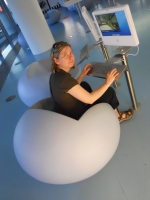Dr. Mary Bunch
Innovative Perspectives in Political Theory and Continental Philosophy
Dr. Mary Bunch took an unusual avenue to York University as an interdisciplinary scholar. She was hired to be the Canada Research Chair (CRC) in Vision, Disability and the Arts in 2019 before she received a tenure position as an Associate Professor in the Department of Cinema and Media Arts in 2022. Her focus on minoritized innovative perspectives in political theory and continental philosophy– particularly critical disability theory -- positioned her for the CRC position in VISTA (Vision: Science to Applications). VISTA is a consortium of neuroscientists, engineers, psychologists, philosophers, computer scientists and artists who research and apply knowledge about biological and machine vision.
Dr. Bunch considers herself a political philosopher, although one that falls outside of the disciplinary boundaries of both Political Science and Philosophy. She works at the intersection of disability justice, decolonial thought, queer theory and media arts. Her research looks at worldmaking imaginaries of marginalized groups. Her analysis and partnerships are centered on multiple ways of knowing and perspectives. Her location in a Fine Arts faculty has opened opportunities for her engage collaboratively in research-creation working with artists. Dr. Bunch is committed to non-extractive research; community-based research creation invites people to frame their own analysis instead of “treat[ing] people like research subjects and just kind of trying to extract their knowledge and then frame it with my own analysis... so, research creation, artistic practice provides a really good common language to be able to work across those differences.”
The desire to take on philosophical or theoretical components in her research practice led Dr. Bunch to the Centre for the Study of Theory and Criticism at Western. Through her work experience in community-based feminist and disability policy analysis, she realized that the fundamental problem was not particular policies, nor access to entitlements like rights. Rather, dominant systems of thought – from liberalism and neoliberalism to historical materialism -- limited the solutions people devised to address social and political problems. For her, the Theory Centre offered valuable training in both historical and contemporary critical theory in order to diagnose the problems of the contemporary world. She argues that “This is true not only because theory and criticism can inform innovation, but also because modern western thought is implicated in the challenges the world faces today, from social inequality to political crises, to ethical quandaries pertaining to health and reproduction, to environmental disaster. Having a firm understanding of the foundations of the hegemonic thought that creates current conditions is as necessary as amplifying perspectives that have been systematically excluded within modern systems of power/knowledge.”
Dr. Bunch highly appreciated the learning experience she had in the Centre. “I received an excellent education at the theory Center as a result of both the cohort that I was with and the level of conversation that we had, the expertise and generosity of faculty members, and also the high expectations of the program”. While she noted that with some exceptions, when she was a Theory student the canon of “theory and criticism” that comprised much of the course content and comprehensive exams was narrow, and could benefit from the inclusion of more diverse perspectives, this training was invaluable. She described the intense learning she gained through the comprehensive exam process as enabling the possession of a roster of knowledge that continually informs her reading and teaching.
In regard to suggestions to CSTC students, Dr. Bunch believes it is important to be open to different employment possibilities for post-graduate life. “But if you're looking for an academic job, I would say you've got to figure out your relationship to disciplines”. Those who are “border crossers” in relation to disciplines such as Political Science, English, or Philosophy, are not often well recognized and thus will need to specifically tailor themselves to those fields in their job application packages. The key is to figure out what disciplines one is in conversation with, engage with those disciplines by attending conferences and publishing in disciplinary as well as interdisciplinary journals. Theory students might find that while inter-disciplines might nurture their intellectual innovation, It is disciplines that hire – interdisciplinary programs are seldom in a position where they have their own faculty cohort. Networking by doing service with academic associations is also helpful. Overall, people need to be strategic, persistent, patient, and hard-working in the process of finding academic jobs.



